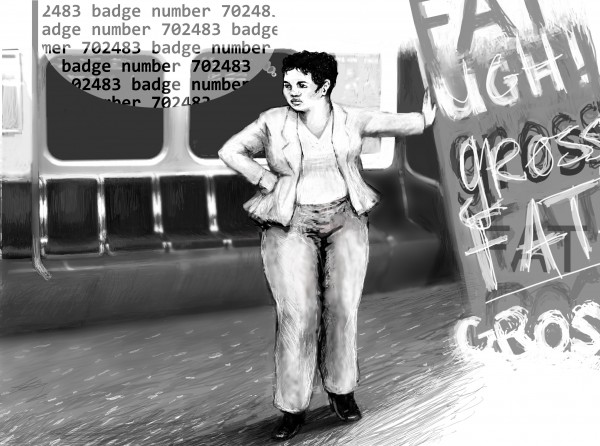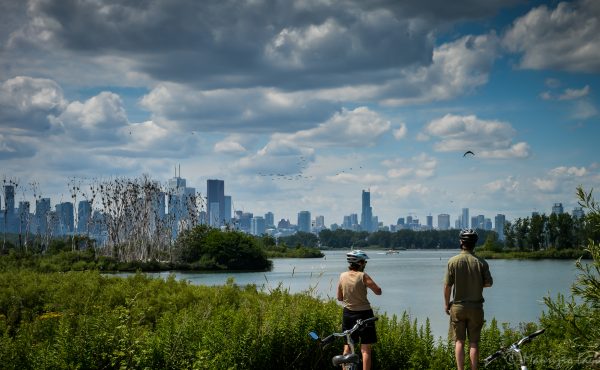Last year, on a beautiful mid-September morning, Tomee boarded the subway in high spirits. She was headed to a rewarding job at a reputable university, pleased with the progression of her blossoming relationship, and felt great about her appearance. And then a few of her fellow passengers cold-cocked her with a series of hurtful comments about her weight.
The three strangers, two males and a female, all in their late 20s, proceeded to verbally pummel Tomee with a barrage of fat insults. Passengers averted their eyes as she contemplated a suitable response. Everyone on the subway was silent except for the trio who refused to relent with the name calling.
Approximately 6 million Canadians are obese, and sadly, many of them have been on the receiving end of public shaming and bullying. Ironically, as the population becomes physically larger, negative attitudes towards overweight people have also increased. Advocacy groups like the Obesity Network equate discrimination towards obese people to racism. And like all “isms” there is a proliferation of inaccurate and deeply unkind stereotypes. Many people believe that overweight and obese people are lazy, lacking self-control, and undisciplined. This creates an alarming number of social and systemic barriers for obese people, including their quality of experience when travelling locally and abroad.
The issue of what one New York Times essayist refers to as “travelling while fat” is not new. For the past couple of decades the airline industry has wrestled with the issue of individuals requiring more space. Seat belt extensions became more widely used, propositions to charge obese people additional travel fees were presented, and research studies looking at the quality of travel experience for obese people were undertaken.
These accommodations and conversations did little to address the real issue. But fortunately, urban planners were beginning to make interesting connections between active transportation and population health. This inadvertently reframed the conversation from tourism travel to include daily commuter experiences. Planners noted that as metropolitan areas began to stretch over larger geographic regions people began to develop an over-reliance on cars. Commuters abandoned active modes of transportation such as walking, cycling, and public transit. This led to numerous inquiries, which further investigated the link between public health and public transit.
In fact, medical practitioners have corroborated the health benefit claims asserted by urban planners creating a substantive business case. For example, the Improving Health By Design in the GTHA report [pdf], led by a group of physicians, unpacks the links between urban planning, active transportation, and public health. The report finds that obesity and physical inactivity (though I’m compelled to point out the two are not always synonymous) costs the region $4 billion and is responsible for 12,500 new cases of diabetes annually. It also tackles the environmental impact of an urban car culture, which threatens our air quality. Among a number of key recommendations the report calls for greater investment in public transit, centralizing public transit (and other forms of active transportation) in planning processes, and strengthening related provincial policies. This is just one of many reports, which thoroughly links public transportation to public health.
Most of us agree that public transportation is a healthy way of moving around.
The problem is that we haven’t adequately explored ways of making the daily commute comfortable for everyone, especially individuals who may benefit most from active transportation options. Universal Design principles offer clear guidelines for achieving this goal. However, the design of many public transit vehicles, and worse, some commuters, are simply unforgiving of larger body types.
In the time that it took you to read this, Tomee casually repositioned herself so she could get a clearer view of the company badge sewn to the uniforms of the two men. She also noted distinctive features such as their eye glasses and tattoos. Later, she conducted an online search, which led her to one of her public transit bullies. Ironically, his photo was posted on his employer’s website because he had been named employee of the month. Tomee contacted his head office. They immediately issued an apology and promised to follow up with the employee.





19 comments
What a horrific experience! This poor behavior isn’t limited to the transit or fat discrimination. I find that Torontonians are getting a lot more unkind in the past 12 years I’ve lived here.
My friends from New York (the supposedly epicentre of rudeness) was surprised by how rude Torontonians are when they came visit. They rationalize it saying it’s the French root, and the national stereotype came from the exodus of nice Canadians to NY. I personally think this is the downside of democracy and mixing of social classes. People these days, spoiled by social media, think they can just speak their mind with no regards of hurting others. (It’s offline-Youtubing) I’m very frustrated by our collective reduction in empathy and courtesy.
I was verbally assaulted by Sears delivery guys over the weekend. To my surprise, my neighbours said, “Well, everywhere you go. there will always be rude people. Let it go.” This acceptance is rewarding rude people and leading to national decline! Kudos to Ms. Tomee for standing up and say that this is unacceptable!
With all due respect amy, your response is very offensive and ignorant. Blaming the “French root”, or the “mixing of social classes”??? Did you form your views by reading Victorian moralists? I don’t want to go further than that interpreting what you meant, but needless to say it’s pretty telling that you complain about rudeness but then feel comfortable with sloppy generalizations about “mixing of social classes”… jeez. I can’t even believe I’m reading that in 2015.
I identify as a woman of color. I happen to be obese. Of all the -isms I experience on a daily basis, size-ism is the most prevalent and socially acceptable. I never would have thought 10 years ago that travelling on the TTC could be such a demoralizing experience. Thank you for this article and shedding light on this issue.
The hecklers are pigs..
“The problem is that we haven’t adequately explored ways of making the daily commute comfortable for everyone, especially individuals who may benefit most from active transportation options.”
..but I disagree that tax payers should have to pay a penny or go to any inconvenience to accommodate those who choose on a daily basis to maintain their obesity and unhealthy life style. Excluding the minority with legitimate handicaps, of course. And lack-of-will-power doesn’t qualify.
Nicholas, how dare you judge Amy, a woman who has no no doubt suffered tremendously from her life-long glandular issues/big bones? As the self-appointed arbiter of right and wrong, she clearly knows better than the rest of us rude Canadians, given that our “French roots” have robbed us of any moral clarity.
Perhaps the bigger issue here, pun very much intended, is that many in society are seeking acceptance for fat people, the vast majority of whom suffer from poor self-control more than anything, rather than forcing them to take some responsibility by, oh I dunno, dieting and exercising the weight away. We don’t treat smokers or drug abusers in the same way, so why do lard-laden people suddenly deserve a pass?
The fact that 6 million Canadians out of a total population of 33 million qualify as obese is pretty damn alarming… Think of the long-term health care costs associated with supporting these land whales, not to mention the cost of reinforcing sidewalks, installing larger seats in buses, or maintaining snack bars in ServiceOntario locations. These are all issues that will weigh heavily on future budgetary allotments (more puns!).
All this to say: if you don’t want people to gawk, put down the fork, start exercising, and take care of yourself, rather than feeling offended by the judgmental stares of others. I’ll let you in on a secret as to why we stare – it’s because we’re amazed to see the lack of self-respect some people have to the point where they resemble someone that clearly lost control one too many times in the buffet line.
I feel no animosity towards people who are obese. However, I do get a sinking feeling when I see a lot of obesity in suburbia. Not because I am judging any individual person. What I am judging is a society that puts people in suburban boxes to get fat in the same way that it puts poultry and other livestock into boxes to get fat.
The suburban livestock-ranching of humans in suburbs that often don’t even have sidewalks or closely-spaced human activities… is pretty horrifying. Is Tim Hortons really all we have to live for in this country?
Hmmm… I’ve seen it done. I’ve watched people snicker or roll their eyes when a large passenger comes on board. I just can’t imagine how stressful that would be every time I had to get in a street car, or an airplane. I had a friend who I travelled with who had to use an extended seat belt… She was mortified to have to use it.
. But as the article states, more and more people are in fact needing it. This is a conversation that could be talked about for hours…being obese in the city is not and I believe will never be accepted…even though the city is getting bigger as I type this.
Rachael Rickards
@qatzelok
We’ll thank you not to refer to the Soylent company’s suburban prospect employees as “poultry.”
I just have to wonder what makes people feel so great treating someone else like garbage. It is pretty disgusting that people are so narcissistic that they can project their own loathsome ideals of worth onto another human being. It makes me incredibly sad that their self esteem is so insufficient that they have to drag the rest of society with them.
I’m fat and you can laugh at me…. But the plague in this city isn’t us…. it’s the self righteous, egotistical people who love nothing other than themselves. These traits destroy communities and all you end up with is a cold city nobody gives a shit about.
I have no doubt that larger people, especially women, face unacceptable behaviour – words, actions, looks, whatever – from others in public. On transit this must be especially difficult considering it is a confined space from which it is essentially impossible to escape others’ mistreatment.
I can’t say that I’ve ever seen anyone being openly mocked or derided for their weight in the manner described in this post, but eyerolling and the like happens quite a bit. No one cares if a skinny person eats grapes on the subway, but god help us all if a chubby person dares to open a bag of chips. It’ll take three stops to gather up all the eyeballs that’ll roll right outta the busybodys’ heads.
It also happens to people who appear “different” in all kinds of ways: gender non-confirming appearance, tattoos, carrying more parcels than deemed appropriate (even outside of rush-hour), whatever. People just relish judging others and assuming they know exactly what the story is even when they have zero information. Witness the bull above about “self-control”, “putting down the fork”, etc.
I didn’t understand so-called “microagressions” until I needed to use a cane for several months due to a back injury that messed up my sciatic nerve. As a young-looking man who appears otherwise healthy, I kept getting the stinkiest of stink-eye from middle-aged folks (especially women for some reason?) in public places – grocery stores, walking down the street, transit, etc. – for no apparent reason. This had never happened before. Then I finally understood that they were eyeing my cane, then me, and then their brains were fried by disjunctre between a young person with an “old man cane”. As they judged me (why? I have no idea – maybe I must have “done something stupid” or was “clearly faking it” or maybe they assumed I was “a leech on disability”?) it was showing plain as day on their faces. Most didn’t seem to realize it.
When this happens to you five our six times each time you commute… the effect adds up. It doesn’t matter, they’re just strangers, but it really begins to affect your view of humanity.
We should all have compassion for one another, or at least keep our negative tendencies to ourselves in public. You may not even realize you’re doing it… but if you’re thinking it there’s a good chance it’s showing on your face. Try thinking again – why *are* you thinking it?
I have no problem with fat people but am I wrong to feel uncomfortable when they are touching me while I am sitting on the subway? I know its crowded but I only take up 1 seat, with some space on the edge of the seat. My seat is not left over room for them to take up and rub up against me. I understand touching and bumping into others happens all the time on the crowded TTC but just sitting there with someone’s thigh rubbing against mine is a gross feeling. Its especially uncomfortable on a hot day.
I identify as a woman of size and I have a sense of un-ease about this article. First of all we hear a story about a woman who was fat shamed in the subway and then the next paragraph the writer gives stats about “Obese people” in Canada. It is truly upsetting to me on a variety of levels. First, the word obese and the BMI scale is a gross a medicalization of the human body, and the pathologization of a natural state. I found it challenging to read this article because just by using the term “obese” to talk about Tomee’s experience is othering her and is saying that somehow her body is a problem and that we as a society should be nice or accept her with her obese issue. I am a woman of size and I am healthy, eat healthy and one of my concerns is that we live in a world where my body is seen as a problem and that somehow I need to be fixed or have some discipline. I know that there are people who definitely have medical issues but I would make a huge assumption to say that probably Tomee is not one of those people considering the picture you chose to post with the article. Hoping my post is taken with understanding because it is clear that you want to address fat phobia however words have power and can further alienate folks. Thank you for taking the time to read this.
Someone I know who experiences fatphobia everywhere they go – and rarely sits on transit as a result, told me an amazing story of allyship recently. They were sitting on a two-seater bench on the bus. A woman went to sit beside them, and my friend immediately got anxious and tried to make themselves (quote) “as small as possible” to make room for this person. The woman sitting down said, “Oh, please don’t worry. There is plenty of room for the two of us. Take all the room you need”. My friend said they had NEVER experienced such compassion and solidarity from a complete stranger before, and they suddenly felt like they could sit comfortably, be themselves, and ride the bus like everyone else.
To “please don’t touch me”, above: I think I can understand where you are coming from. But it seems to me that you may be fixating on the feeling of a larger person touching you as opposed to the feeling of a smaller person touching you. I am a 5’11” man with a “normal” BMI (we can problematize that, perhaps, as someone above has done but work with me here for a moment). When I am sitting next to someone on transit, no matter their size (unless they are a small child) we are pretty much always touching. Is it, instead, the experience of being close to a “fat” person that bothers you more? Does it make you feel that they are selfish and taking away public space that somehow belongs to you by right? Or is it simply that there is quantitatively more contact (because, again, there is likely always some contact)?
Investigating this feeling is probably more productive than placing responsibility for your feelings on someone else.
I NEVER comment on my own pieces but I wanted to acknowledge Susan Valentino. Susan, please know that I’ve considered your position and agree that words are not neutral. My use of the term “obese” was not intended to be negative and you’ll note that it was used within both a medical context and is also part of the name of the advocacy group addressing the issue. I carefully looked into the multiple uses of the word before using it. Also, when citing a research study, I felt compelled to note that weight and physical inactivity were not always synonymous. I’m not simply suggesting that people should be “nice” or “accepting”; my analysis and work are far more sophisticated than that. I’m interrogating social attitudes and design. I see beauty, health, and capacity in every body type, size, and shape. I’m committed to sparking conversations, which help to create inclusive urban spaces. Within an online context, I’m given 650 words and so I’m grateful for your respectful feedback. Thank you.
Dear Welp,
If you ever have to use a cane again and have the same problems, may I suggest joining the Royal Canadian Legion. Even if you are not a Veteran, you can join as an Associate Member. Then you can wear a Legion jacket while out using your cane.
The sort of people who are going to foolishly jump to conclusions will probably classify a young man using a cane wearing a Legion jacket as “wounded Army veteran.” And will probably not hassle you.
So what Toronto company does BADGE No. 702483 represent so poorly? Employee of the month indeed! Let us know so we can give him some of our feedback and thoughts. Then he can be the embarrassment of the month. Sorry you had to go thorough this. After the age of 55, I started experiencing age-ism from co-workers who were in their mid-twenties-early-thirties. “isms” are so hurtful and it is the cowardly bullies who seem to thrive off using them.
There is no excuse in any public space to be
intolerant of a person’s size. Civility is essential in a humane society. I’m in shock of some of the cruel comments. Thank you Jay Pitter for writing this important piece and opening the channels of communication.
What a terrible thing for someone to have to go through. Tomee was very resourceful in finding the name of that man. There are so many ignorant, self righteous people out there. I am a large size woman and I can’t even go for a walk and get some exercise without running a gauntlet of insults, often by the same people who are always going on about overweight people being lazy and needing to get more exercise.